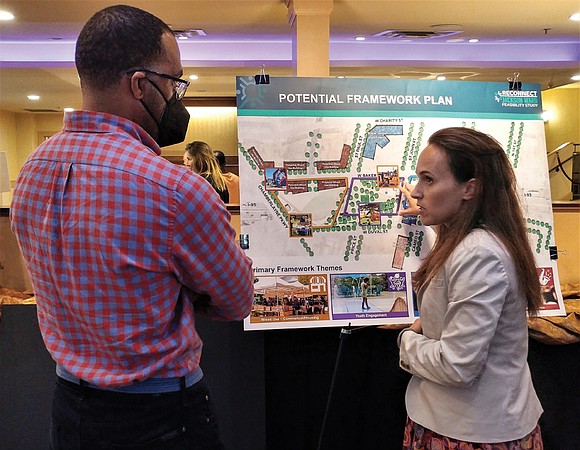Jackson Ward residents continue to hear plans, explore ideas for historic neighborhood’s future
George Copeland Jr. | 7/7/2022, 6 p.m.

The latest proposal to reunite the former “Harlem of the South” was unveiled to Jackson Ward residents and government stakeholders at the Hippodrome Theater on June 29. All were eager to hear and discuss updates for the Reconnect Jackson Ward Project.
The current framework, developed through multiple community workshops, is to build a structure over a four-block section of Interstate 95, connecting Gilpin Court and Jackson Ward. Interstate 95 separated the Black-majority community when it and Interstate 64 were constructed in 1958 and 1957, respectively, displacing many families in the process.
Greenery, new buildings and more would be added over this structure, with the intent of creating a space that celebrates and sustains the Black culture and history present in this community. The framework is part of a larger feasibility study still in progress, and planners stressed that the project is still in its early phases, with more community planning and revisions likely in coming months.
“This project right now is just figuring out what could be built, but what will be built, we’re still working on that,” said Maritza M. Pechin, deputy director for Richmond’s Office of Equitable Development and project director. “We want this to be a connection that is beneficial and uplifts Jackson Ward residents and businesses.”
Maintaining a physical, financial and cultural stake in the reshaping of Jackson Ward remains a major priority for Jackson Ward residents, some of whom voiced concern over the potential for gentrification and a major shift in the district’s demographics.
For other community members, there is still much to do in addressing the long-term issues still facing Jackson Ward.
C.B. Chambliss, whose family has been in Jackson Ward for 40 years, called for an approach that treated the reconnection as a chance for reparations that would address how the district has been neglected.
Earlier on June 29, Mr. Chambliss pointed to the return of the former Bruce’s Beach property in California, originally a resort for African-Americans in the 1920s until the land was seized by the local government, to the family that first owned it.
He said that is an example of the kind of ownership and investment that should be considered for Jackson Ward residents.
During the meeting, Mr. Chambliss’ remarks earned him praise and criticism from Jackson Ward residents. Yet his words led to a more detailed discussion in terms of where the Reconnect Project stands, what other residents want to see and what are the possibilities.
“Let’s put something in the hands of those that lost it or their descendants,” Mr. Chambliss said. “A conversation solely focused on equity would be awesome.”
“Land and money, a whole (conversation) solely focused on that, not parks, not all this other stuff. I think something like that would be very beneficial.”
Ms. Pechin noted that a community plan for all of Jackson Ward, in partnership with the Richmond Redevelopment and Housing Authority, is in its early stages and would seek to address these kinds of concerns. Black homeownership, business growth and entrepreneurial opportunities are being incorporated into this community planning process, and the solutions developed could potentially be applied beyond Jackson Ward to other parts of the city, she added.
“We’ve definitely heard loud and clear that the future of this reconnection in the community needs to be one that uplifts and upholds and adds more ownership for black people in Richmond,” Ms. Pechin said.
Reconnect Jackson Ward is part of the larger Richmond 300 master plan recently approved by city officials to revitalize the city and set government priorities for years to come. The proposed framework is currently estimated to cost potentially $100 million or more to complete, and will have to compete with similar projects nationwide for funding from the Reconnecting Communities Pilot Program.
With grant applications for the Pilot Program due by Oct. 13 and more community meetings scheduled throughout 2022, there is still more work and discussion ahead, for both planners and residents, to see the potential future of Jackson Ward finalized and eventually realized.






